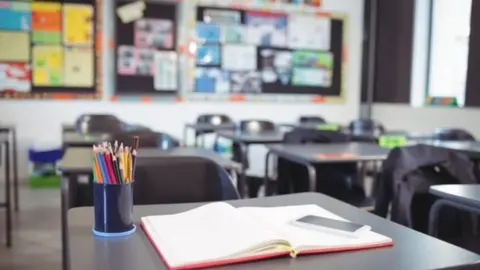Sex education classes in Ireland 'inadequate', pupils claim
 Getty Images
Getty ImagesPupils in the Republic of Ireland view Relationships and Sexuality Education (RSE) in schools as "inadequate" and "too biological".
That is one of the findings of a major government review of RSE.
It sought the views of pupils, teachers, parents and relevant groups on how topics like sexual consent and relationships should be taught.
It was carried out by the National Council for Curriculum and Assessment (NCCA) and began in June 2018.
RSE is taught in the Republic of Ireland as part of a compulsory subject called Social, Personal and Health Education.
It has been a part of the curriculum since 1995, but the NCCA said that "life in Ireland has changed greatly" since then.
As a result, Ireland's Education Minister Joe McHugh asked the NCCA to review the RSE curriculum.
The review looked at topics including sexual consent and what it means, along with developments in relation to contraception, sexual expression and relationships.
It also looked at safe use of the internet, social media and the effect that these have on relationships and self-esteem, as well as LGBTQ issues.
Many of the school pupils consulted by the review team said there was no "consistent or comprehensive approach" to how RSE was taught.
"Students frequently said it was limited to a narrow range of topics and overly influenced by teachers selecting the topics that they felt most comfortable teaching or considered to be of relevance to the students," the review reported.
"With the exception of one school, students who participated in focus groups all spoke about an abstinence and problem-based approach to RSE being the prevalent model experienced; one predominately concerned with the risks and dangers of sexual activity rather than focusing on the positive aspects of relationships and sexuality.
"Students believe very strongly that telling them not to do something or merely pointing out the dangers of sexual activity is unhelpful and misguided."
 Getty Images
Getty ImagesPupils told the review team that they wanted to be taught more about issues like sexual orientation, consent and healthy relationships.
Teenagers also said they were much more likely to look to friends or the internet for guidance on sex and relationships than teachers or parents.
The NCCA found that there was a range of opinions among parents about RSE, with some opposed to it being taught at school at all or taught to younger children.
Others, though, wanted their children to have in-depth and age-appropriate lessons throughout their school career.
Many parents wanted their children to be taught about consent, sexual orientation and contraception at school.
However, an online survey carried out by the review's authors found that post-primary parents considered knowledge of how to avoid sexually transmitted infections the most important topic their children could learn about.
'Critical voices'
Many parents also felt their school should consult them about RSE teaching.
"In the main, most parents are unaware of the scope of learning within the RSE curriculum and many would like schools to do more to involve and inform them in this area of their children's education," the review said.
"Most principals see parental engagement in RSE as an enabling factor, although some are aware that a small number of critical voices can exert undue influence and have a negative impact on what is taught."
Principals expressed the hope that the NCCA review would lead to clearer RSE guidance to schools and that it would lead to relationship and life skills being given more attention in schools.
The review made a number of recommendations including the development of up-to-date teaching resources and more specialised training for teachers.
An updated RSE curriculum for schools in the Republic of Ireland is due to be developed in 2020.
However, Mr McHugh said that there would be further public consultation before final changes to the RSE curriculum were made.